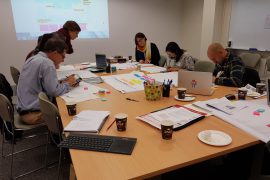It has been estimated that the human brain takes in around 34 gigabytes of data each day. For our students, much of this will come in the form of slides and reading materials that we have made. When making teaching resources with tools such as Word or Powerpoint, it is relatively easy to ensure that they will be accessible to the many students who have some level of visual impairment. By making use of features in these software packages before converting to PDF, your resources can become either immediately accessible or are optimised to work properly with screen readers.
Detailed instructions on using the accessibility features in different versions of Word and Powerpoint for Windows and Mac are provided on the excellent WebAIM website. Tips include:
- Structure the document using headings and use Word styles for these rather using bold or a larger font size.
- Add alternative (‘alt’) text to images.
- As URLs may not make sense to screen readers, use descriptive text for links (as shown above) instead.
- If the document may get printed, add the URL to the descriptive text for the link.
- When including graphs, consider using a texture or pattern as well as colours to distinguish data series.
- For Powerpoint, consider using the University template as well as the tips above.
- In the 2010 (and newer) versions of Word and Powerpoint, use the inbuilt accessibility checker to identify and repair any remaining issues.
Vision Australia offer a free ‘Document Accessibility Toolbar’ for Word to make accessible document creation even easier.
As students will usually be linking to your resources on the course website, ensuring this is designed to maximise accessibility can also ensure learning outcomes for all students are maximised:
- Tips on making accessible websites
- Tips from Blackboard on making accessible sites and resources in the LMS
Finally, you can use a screen reader emulator or browser add-on to test your resources:
- Screen reader extensions for popular browsers include ‘Vox’ for Chrome and ‘Fangs’ for Firefox.
- WAVE (WebAIM’s web accessibilty evaluation tool).





